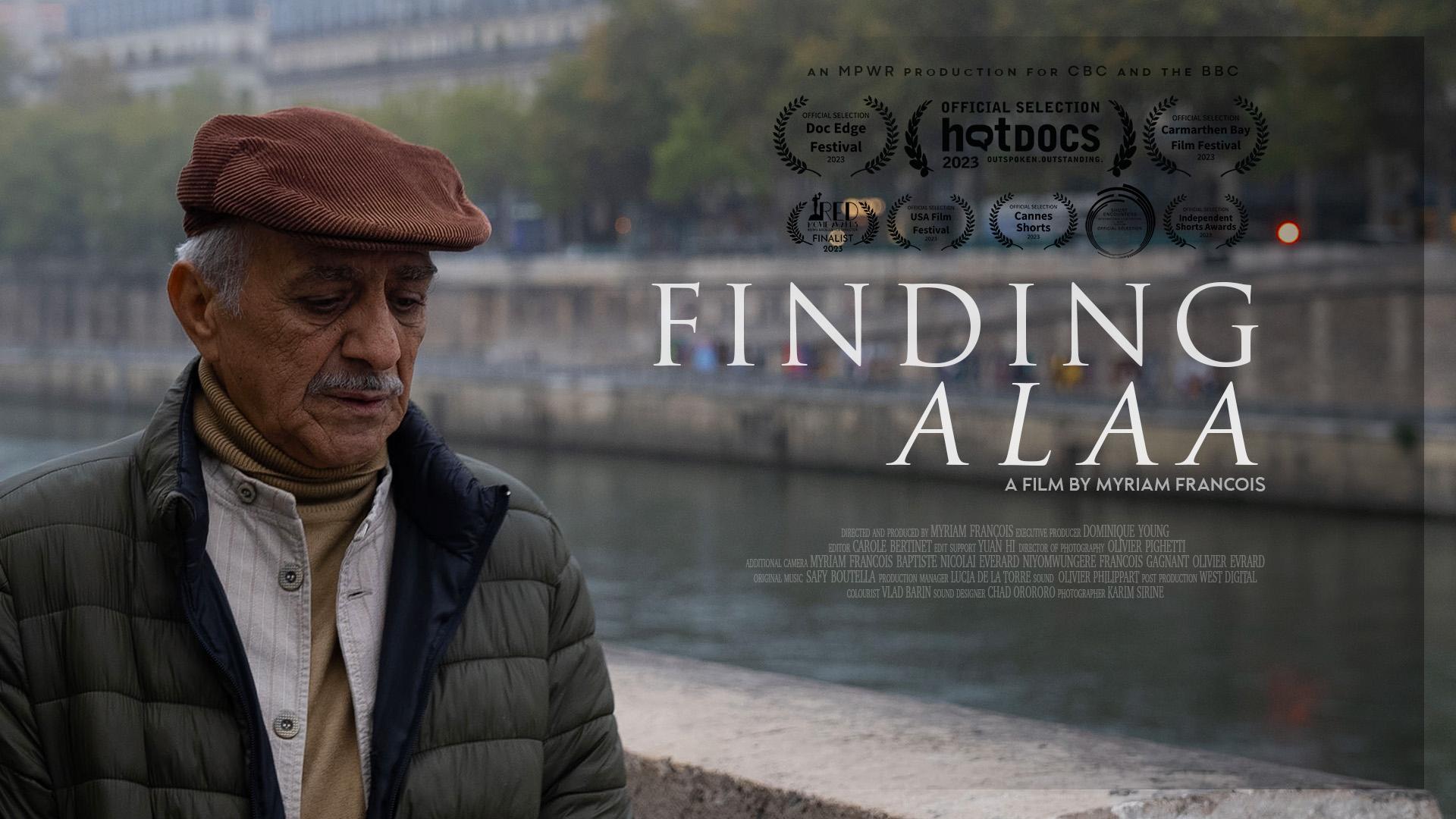Synopsis:
Azdyne Amimour, a modest Parisian husband, father and grandfather. After a long and varied working life, at 74 he should be contemplating a peaceful retirement. But his days are fuelled by one overriding goal to find his missing granddaughter and make reparations for his son’s crimes.
On 13th November 2015, Islamic State launched a series of coordinated attacks on the Bataclan Hall and other Paris venues, killing 130 people. Azdyne’s son, Samy Amimour, was one of the three Bataclan attackers; as police approached and fired at him, his suicide belt exploded. Samy left behind a daughter, Alaa, born in Syria just days after the terrible events. And now Azdyne feels he can’t move on with life until he finds her. He feels responsible for her fate, as an innocent child, caught up in the trail of harm caused by Samy’s actions.
As his life and family unravelled in the wake of the attacks, Azdyne struggled to deal with guilt and shame, and with understanding the path that led his “quiet and thoughtful” son to perpetrating France’s worst terrorist attack in modern history. In the face of public disgust and fear, he actively sought ways to contribute to the national attempt to understand the tragedy, and to heal society and himself. In the years since 2015, one objective has sustained him – a vow to find the granddaughter he has never met and bring her home.
We meet Azdyne in 2019 as he takes initial legal steps towards finding Alaa. Recounting the events of that night in November 2015, it is clear that the guilt and pain live with him and with Sami’s mother, Mouna, still. We see a fruit that has grown from the despair of the attacks, the deepening friendship with George Salines, whose daughter Lola was killed in the Bataclan. Together, the two engage with ex-prisoners to help counter Islamic State propaganda, and are instrumental in a group which brings together the families of victims and families of perpetrators of terrorism, equally determined, and united, in not wanting to allow terrorism to further divide France. Over the course of several years, Azdyne learns piecemeal information about Alaa, her whereabouts and wellbeing, which fuel his desire to head to Syria to help her. But the path to Syria is perilous and blocked at many turns. Suddenly, in July 2022, the bittersweet news breaks: Alaa has been repatriated to France. She is safe, but Azdyne will still, for an indeterminate length of time, be unable to finally meet her.
Finding Alaa is the story of one man’s search for his granddaughter – and the story of loss, guilt, of the shattering effects of terrorism on families and society and the search for reconciliation by those left behind.This is the story of the other victims of Isis - those whose stories we have yet to hear.
Synopsis: (500 words max)
Azdyne Amimour, a modest Parisian husband, father and grandfather. After a long and varied working life, at 74 he should be contemplating a peaceful retirement. But his days are fuelled by one overriding goal to find his missing granddaughter and make reparations for his son’s crimes.
On 13th November 2015, Islamic State launched a series of coordinated attacks on the Bataclan Hall and other Paris venues, killing 130 people. Azdyne’s son, Samy Amimour, was one of the three Bataclan attackers; as police approached and fired at him, his suicide belt exploded. Samy left behind a daughter, Alaa, born in Syria just days after the terrible events. And now Azdyne feels he can’t move on with life until he finds her. He feels responsible for her fate, as an innocent child, caught up in the trail of harm caused by Samy’s actions.
As his life and family unravelled in the wake of the attacks, Azdyne struggled to deal with guilt and shame, and with understanding the path that led his “quiet and thoughtful” son to perpetrating France’s worst terrorist attack in modern history. In the face of public disgust and fear, he actively sought ways to contribute to the national attempt to understand the tragedy, and to heal society and himself. In the years since 2015, one objective has sustained him – a vow to find the granddaughter he has never met and bring her home.
We meet Azdyne in 2019 as he takes initial legal steps towards finding Alaa. Recounting the events of that night in November 2015, it is clear that the guilt and pain live with him and with Sami’s mother, Mouna, still. We see a fruit that has grown from the despair of the attacks, the deepening friendship with George Salines, whose daughter Lola was killed in the Bataclan. Together, the two engage with ex-prisoners to help counter Islamic State propaganda, and are instrumental in a group which brings together the families of victims and families of perpetrators of terrorism, equally determined, and united, in not wanting to allow terrorism to further divide France. Over the course of several years, Azdyne learns piecemeal information about Aicha, her whereabouts and wellbeing, which fuel his desire to head to Syria to help her. But the path to Syria is perilous and blocked at many turns. Suddenly, in July 2022, the bittersweet news breaks: Alaa has been repatriated to France. She is safe, but Azdyne will still, for an indeterminate length of time, be unable to finally meet her.
Finding Alaa is the story of one man’s search for his granddaughter – and the story of loss, guilt, of the shattering effects of terrorism on families and society and the search for reconciliation by those left behind.This is the story of the other victims of Isis - those whose stories we have yet to hear.
Synopsis: (500 words max)
Azdyne Amimour, a modest Parisian husband, father and grandfather. After a long and varied working life, at 74 he should be contemplating a peaceful retirement. But his days are fuelled by one overriding goal to find his missing granddaughter and make reparations for his son’s crimes.
On 13th November 2015, Islamic State launched a series of coordinated attacks on the Bataclan Hall and other Paris venues, killing 130 people. Azdyne’s son, Samy Amimour, was one of the three Bataclan attackers; as police approached and fired at him, his suicide belt exploded. Samy left behind a daughter, Alaa, born in Syria just days after the terrible events. And now Azdyne feels he can’t move on with life until he finds her. He feels responsible for her fate, as an innocent child, caught up in the trail of harm caused by Samy’s actions.
As his life and family unravelled in the wake of the attacks, Azdyne struggled to deal with guilt and shame, and with understanding the path that led his “quiet and thoughtful” son to perpetrating France’s worst terrorist attack in modern history. In the face of public disgust and fear, he actively sought ways to contribute to the national attempt to understand the tragedy, and to heal society and himself. In the years since 2015, one objective has sustained him – a vow to find the granddaughter he has never met and bring her home.
We meet Azdyne in 2019 as he takes initial legal steps towards finding Alaa. Recounting the events of that night in November 2015, it is clear that the guilt and pain live with him and with Sami’s mother, Mouna, still. We see a fruit that has grown from the despair of the attacks, the deepening friendship with George Salines, whose daughter Lola was killed in the Bataclan. Together, the two engage with ex-prisoners to help counter Islamic State propaganda, and are instrumental in a group which brings together the families of victims and families of perpetrators of terrorism, equally determined, and united, in not wanting to allow terrorism to further divide France. Over the course of several years, Azdyne learns piecemeal information about Alaa, her whereabouts and wellbeing, which fuel his desire to head to Syria to help her. But the path to Syria is perilous and blocked at many turns. Suddenly, in July 2022, the bittersweet news breaks: Alaa has been repatriated to France. She is safe, but Azdyne will still, for an indeterminate length of time, be unable to finally meet her.
Finding Alaa is the story of one man’s search for his granddaughter – and the story of loss, guilt, of the shattering effects of terrorism on families and society and the search for reconciliation by those left behind.This is the story of the other victims of Isis - those whose stories we have yet to hear.


